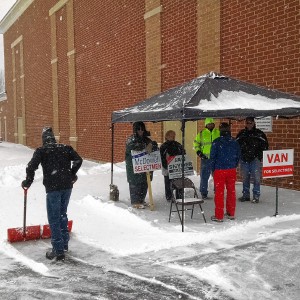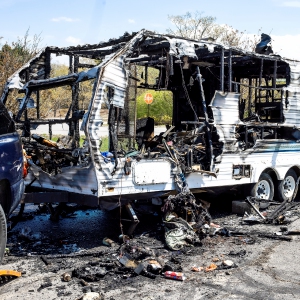Women who overcame sex trafficking making a difference in N.H.
| Published: 03-17-2019 10:00 PM |
He called himself Ace, and he came looking for young vulnerable girls that he could sell for sex.
He rode into Haverhill, Mass., in a shiny black Lincoln Continental, with red interior. Into a poor neighborhood with three-story tenements and peeling paint. With girls in the street, hanging around, oblivious to this man’s actual motivation.
Ace, however, knew enough about the girls, at least some of them. He knew the emotional and physical pain they had endured would make them prime candidates for his twisted goals.
Abuse, you see, lived in this neighborhood as well, and abuse served as an ally for Ace.
He was a bodybuilder with big muscles and jet-black hair. He seemed charismatic, charming and attentive. And he was recruiting, looking for a certain type of girl who was vulnerable, poor, hopeless. Girls who would become commodities he could sell to affluent middle-aged white men, for sex.
“I don’t know if I’d think he was good looking today, but I thought he was quite handsome at the time,” Darlene Pawlik, now 52, said last week, as the buzz from the lunchtime crowd was just building at a downtown restaurant.
“He was a jovial, friendly person. He was specifically there to target. At the time, I didn’t understand that.”
How could she? She was 13. She looked younger. She would have listened to anyone who gave her even a sliver of hope, a morsel of promise.
Article continues after...
Yesterday's Most Read Articles
 ‘I thought we had some more time’ – Coping with the murder-suicide of a young Pembroke mother and son
‘I thought we had some more time’ – Coping with the murder-suicide of a young Pembroke mother and son
 The Appalachian Trail in New Hampshire just got easier, as another debate looms over replacing structures in wilderness areas
The Appalachian Trail in New Hampshire just got easier, as another debate looms over replacing structures in wilderness areas
 Two Weare select board members resign
Two Weare select board members resign
 Thirst place: Concord maintains its drinking water dominance
Thirst place: Concord maintains its drinking water dominance
 Lawsuit: Former Belmont High student alleges principal failed to stop sexual abuse by teacher in 2009
Lawsuit: Former Belmont High student alleges principal failed to stop sexual abuse by teacher in 2009
 Baseball: Syvertson suits up for CCA in narrow win over Franklin
Baseball: Syvertson suits up for CCA in narrow win over Franklin
She tucked that day away, into the corner of her mind, and when things exploded at home, where she was molested by a family member on a regular basis from a young age and her mother suffered from emotional distress, preventing her from showing her daughter the love she needed, she called Ace and asked for a job, then waited for him in the gray and slush of winter, in front of the local drug store.
It was her birthday. She was 14.
“I was wondering if anyone could see me,” Pawlik remembered. “It seemed like no one could see me. I was just standing there, invisible. That’s how I felt.”
Pawlik now lives in Raymond and has come a long way since Ace picked her up in his big black car nearly 40 years ago. She’s married, has five children, went to nursing school.
She works for the New Hampshire Human Trafficking Collaborative Task Force, training medical professionals, service providers and law enforcement officials in Concord about human trafficking.
“We give an overview of what we know about trafficking in New Hampshire, which is not a lot because it’s a very underground crime,” Pawlik said. “It’s very hidden in plain sight.”
It’s gaining attention, at least recently, ever since a billionaire allegedly paid for a sex act at a Florida massage parlor that police said was trafficking women. No one has since been charged with trafficking, but the arrest of Patriots owner Robert Kraft caught the public’s attention, and if nothing else, brought this crime out from the shadows. At least somewhat.
It’s a crime fueled by powerful, entitled men, both from the business standpoint and the consumer standpoint. The girls and women who get drawn in believe financial security is just around the corner, blind and brainwashed to the trap that’s been set before realizing it was all a lie.
“I was selling a fantasy,” said 38-year-old Jasmine Grace Marino of Nashua, who fell into a similar abyss as Pawlik. “I was selling a facade, so my story of real life was that I was a student at Northeastern or BU. I went to every college in Boston, going through the college life I would have wanted.
“I should have been 22 and at a real college and pursuing my dreams, but instead, I was trapped in this life.”
Marino is an example that this can happen anywhere, to anyone, even to the daughter of a well-educated engineer, growing up in a middle-class setting.
She’s also an example, like Pawlik, of resilience and strength. She’s married, has two children with her current husband, plus another daughter, and with her husband’s two kids, five overall.
Also like Pawlik, Marino devotes her life to helping women trying to escape the sex-trafficking. She created Bags of Hope, based in Boston. She wants to expand to New Hampshire.
She and her group speak publicly about the issue and mentor those who have been prostituted and perhaps have a drug addiction. The bags of hope, handed out by Girl Scouts and church groups, contain soap, deodorant, shampoo, socks. Marino says more 1,000 bags are given away each year.
“The most vulnerable women,” Marino said, referring to her clientele. “Many are trafficked. They come to treatment for detox and come in off the streets and have nothing. Women go from jail to halfway houses and they have nothing.”
Marino’s story begins in Revere and Saugus, Mass. Her background includes a mom with bipolar disorder who set no boundaries; a dad with a career that distracted him from family; and a brother who was sexually abused by a family member and who later died from a crystal meth overdose, confused about his own sexuality and unable to escape his past.
Marino says she was raped at age 13 by a 16-year-old boy. She couldn’t recall much, her mind at the time clouded by binge drinking and drugs.
“I thought it was my fault, lot of shame, what did I do wrong?” Marino said. “I did not realize the roots. I should not have been with older men. I was taking it all upon myself and not giving blame to him.”
She was 19 when her drug-dealing boyfriend saw a way to make even more money. So he conned his girlfriend.
“It was something he was going to start to do and I happened to be the first one,” Marino said. “It was a grooming process, take me to dinner, get my hair done, promising me that I could do better if I worked in a massage parlor. What was the big deal? I was having sex anyway. Why not get paid?”
There was a plan in place. Or so she thought. One day she’d have enough money to open her own business. A hair salon.
Yes, she was disgusted by the idea of being sold, training herself to shut down, flip a switch to turn off body and mind, a coping mechanism.
Maybe, she thought, it wouldn’t last long. She worked in a nondescript brick building in Connecticut. Men paid a $60 entry fee. They went upstairs, to a lobby, a display case, where Marino was one of about a dozen women, sitting on a couch, “dressed in skimpy dresses and high heels,” she remembered.
Her shift was 10 a.m. to 1 a.m.
“There were eight or nine rooms around back with mattresses,” Marino said. “I don’t remember how many men, but in later years I started to write down how much I was making because he was promising me I could retire. I would ask him how much I had and he would say we don’t have enough yet.”
Not enough? Marino said she once made $1,600 in a single day. She said she made $24,000 in one particular month.
“I never saw a dime,” Marino said.
She told her ‘boyfriend’ she’d had enough, more than once, but he talked her out of it every time. Not with words. With his hands and fists.
“Threatening me,” Marino said. “Domestic violence on steroids. I thought it would get better.”
She was forced to have sex against her will for five years, then fought a heroin addiction. When her brother died from the drug overdose in 2006, she looked hard at herself and began plotting her escape, stashing away money, a little at a time so her pimp wouldn’t notice.
She deposited the money into her own makeshift bank account – zip lock bags tightened with elastics to keep water out and buried below her potted plants. In six months, she had a few grand. She escaped and about three years later, she had a husband.
“There’sempowerment to see myself as a survivor, not a victim,” Marino said.
Pawlik feels the same way, and her road to a secure home life and loving family was no less perilous. She was first molested in a secret room in her family’s barn at the age of four, maybe five. Her family was poor and Pawlik lacked proper winter clothing.
The man named Ace who came along years later promised her warmth and money. That’s why she called him, and that’s why she got in his Lincoln that day, on her 14th birthday. He sold her for sex that same night, to a businessman from Atkinson. The two had sex in Ace’s bed.
“I was thinking I was cold,” Pawlik said. “My feet were cold and I awkwardly pulled off my socks. I was so young and so little. I weighed less than 100 pounds. This guy was so happy. He looked like a little kid.”
She continued: “The men used me with no regret to my wellbeing. My trafficker would often comment about how terrible I looked and give me just enough money for some drugs to numb the pain.”
Ace convinced her to sneak out of her home at night to work, and she eventually ran away and lived on the streets, drinking alcohol, snorting coke, popping valium, smoking weed.
She went days without sleeping in a bed or eating. She moved in and out of foster homes. The owner of a Store-24 in Lafayette Square let her sleep there, on a magazine rack for a mattress and a world almanac for a pillow.
She was labeled as a child in need of services, a gross understatement if there ever was one.
At 17, Pawlik lived with a man who called her his house pet. She got pregnant and was told to have an abortion. She convinced him she’d do it, then she ran again. This time, a social worker connected her with a woman named Marilyn, who ran a shelter in Hull, Mass., and who gave Pawlik a place to stay for six months and a new way of looking at life.
“She taught us how to forgive,” Pawlik said. “It was transformative to be in a safe environment and talk to people.”
She’s been married for 28 years, to a man she calls Mr. Wonderful. She told Mark Pawlik about her past, but at her own pace. A little here, a little there. He saw her rage, wiped away her tears, calmed her after nightmares, broke through her forcefield built from fear and mistrust.
He knew she suffered abuse. He knew her family failed to protect her. It was only after his wife wrote a book five years ago about her life that Mark knew the entire story.
“Think about a 100-piece jigsaw puzzle and this was the building of that puzzle over the course of 25 years,” Mark, an engineer, said by phone. “When you live with someone day in and day out, you have an indication there is something bigger underground, more than a gasoline tank. It could be a nuclear reactor.”
Darlene’s oldest daughter, Ashley Fairbanks, was part of this puzzle. She’s the child Darlene refused to give up after lying to the father that she would have an abortion. Today, Fairbanks is 33, married, the owner of her own hair salon in Manchester.
She says her mother told her things about her past in different stages, comparing them to movie ratings, from G to PG to PG-13 to somewhere between R and X.
This daughter could not be more proud of her mother. “I know her background but I always viewed her the same way,” Fairbanks told me, “as someone always giving, making sure the elderly and the young and the sick were cared for. She had given me tiny bits and relayed things that had happened to her, and then reading the book was the real deal.”
Marino has a book too, journal entries from her dark days. Both women said they found God, plus people who gave them hope, guided them, inspired them. Both are drug-free and in recovery. Both have families.
And both are excited about Bridgit’s House of Hope, a shelter scheduled to be built somewhere in Laconia once fundraising is done.
Right now, there is no place in New Hampshire like it. No place for women to get help after they’ve been sold into slavery.
No place for people like Jasmine Grace Marino and Darlene Pawlik.
“I think it’s amazing,” Marino said. “Very much needed in New Hampshire. I’m looking forward to seeing women free from this vicious cycle of shame and hopelessness.”
]]>







 ‘I hate to leave’: Three-alarm fire in Loudon burns centuries-old home to the ground
‘I hate to leave’: Three-alarm fire in Loudon burns centuries-old home to the ground Photos: Signs of spring
Photos: Signs of spring 25-year-old Concord man identified as Steeplegate Mall RV fire victim
25-year-old Concord man identified as Steeplegate Mall RV fire victim
